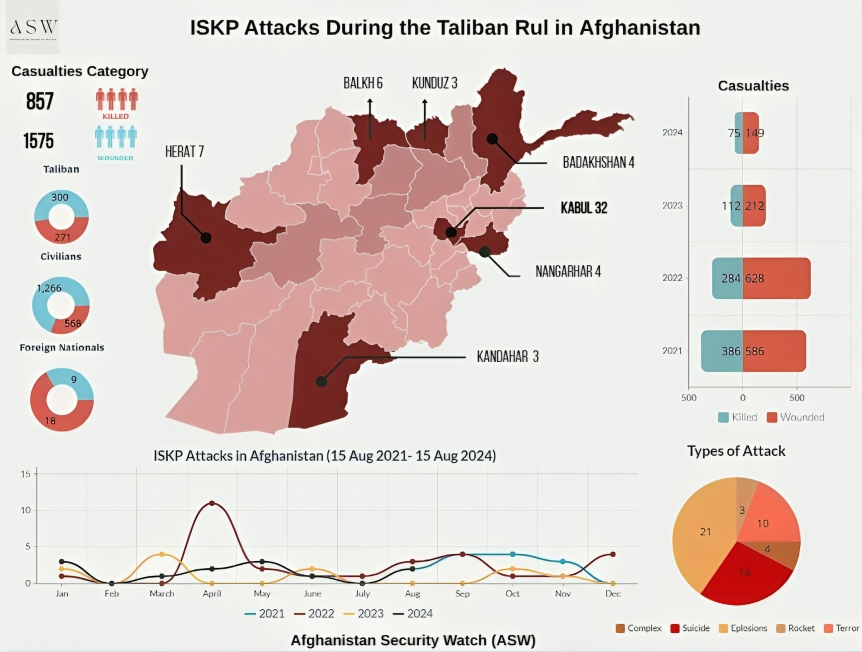Research Details
The Afghanistan Security Watch presents key insights from the upcoming publication, “ISKP’s Attacks During Taliban Rule in Afghanistan (August 15, 2021 – August 15, 2024).

ISKP Attacks During the Taliban Rule in Afghanistan (15 Aug 2021- 15 Aug 2024)
The Afghanistan Security Watch presents key insights from the upcoming publication, “ISKP’s Attacks During Taliban Rule in Afghanistan (August 15, 2021 – August 15, 2024).” These findings are drawn from a recently completed article and will be released to the public soon.
Key Findings:
Since the collapse of the republic in Afghanistan, ISKP has carried out 62 terrorist attacks, resulting in the deaths of 857 people and the wounding of 1,575 others, including civilians, Taliban members, and foreign nationals. Most of these attacks occurred in 2022, with 29 attacks reported. The highest concentration of ISKP attacks was in Kabul with 32 attacks, followed by Herat with 7 attacks, Balkh with 6 attacks, and Nangarhar and Badakhshan provinces with 4 attacks each.
Additional key points about ISKP’s attacks in Afghanistan:
- 2021: After the Taliban released about 3,000 ISIS members and their families from prisons, the group rebuilt its structure and became a serious security challenge for Afghanistan and the region.
- 2022: Internal disagreements, weak governance, and divisions within the Taliban increased ISKP’s influence within various layers of the Taliban and expanded its terrorist attacks in Afghanistan. This year, ISKP claimed responsibility for two rocket attacks on Tajikistan and Uzbekistan from Afghan soil.
- 2023: Intelligence cooperation between the Taliban and regional countries, especially Iran and Russia, led to operations against ISKP, resulting in fewer attacks compared to 2022.
- 2024: ISKP strengthened its cells by focusing on recruitment and propaganda. While it used suicide attacks and complex operations between 2021 and 2023, in 2024, it shifted to lower-cost attacks using magnetic bombs and targeted killings.
ISKP has also increased its propaganda in various languages, including Pashto, Dari, Uzbek, Arabic, Russian, and English, to speed up recruitment among different Sunni ethnic groups, languages, and religious communities.
ISKP’s military targets in Afghanistan are mainly divided into three categories: the Taliban, civilians (especially Shiites and Sufis), and foreign nationals. This has made ISKP a serious security concern for Afghanistan and the Taliban.
ISKP’s Strategy in Afghanistan:
- Consolidating bases in eastern and northeastern Afghanistan to pose a threat to neighboring countries.
- Infiltrating foreign terrorist groups like Tehreek-e-Taliban Pakistan (TTP), the Islamic Movement of Uzbekistan (IMU), and some extremist factions within the Taliban, particularly the Haqqani Network.
- There are unconfirmed rumors that the Jundullah group has joined ISKP in Afghanistan.
- Challenging Taliban rule by exerting military pressure on the group.
ISKP is pursuing this strategy with the potential to become an umbrella organization for other foreign terrorist groups in Afghanistan.
